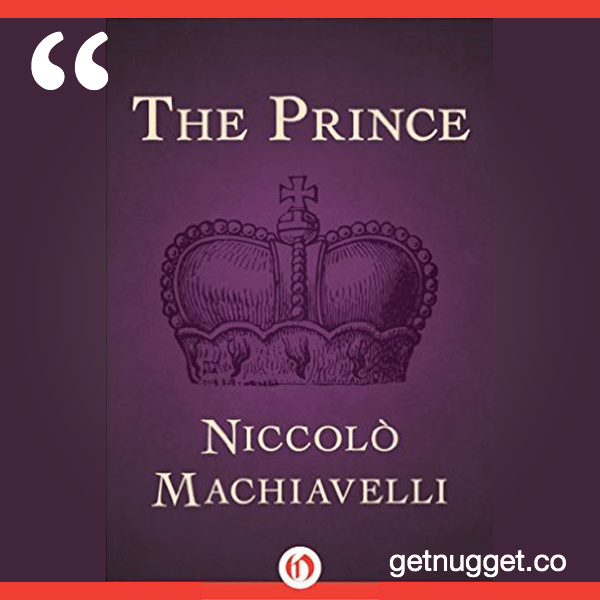The Prince Summary

6 min read ⌚
The Prince by Niccolò Machiavelli
The Prince was written by Niccolò Machiavelli in the 1500s. A timeless content that defies any modern attempts that are trying to bring substantial changes in the world evolution.
AUTOCRACY / THE PRINCE
'My view is that it is desirable to be both loved and feared.' Share on XThis book is about how to acquire and hold power. About autocracy and how to rule with and without laws. Machiavelli’s messages are clear. Brief but memorable. And not least – disturbing and controversial. Any line strikes right to the heart of the readers’ expectations.
How to win friends and conquer countries
Do you wonder how to get power in politics and keep it? Are you a history buff that wants to get at practicing control in the past? Do you question how you can use that information in today’s world? “The Prince” answers some of these major dilemmas.
Well, Machiavelli’s “The Prince” is just for you. Stay with us to tell you why.
Who Should Read “The Prince”? and Why?
The Prince is intended for all audiences especially for historians, enthusiasts -those eager to learn new thing about their ancestors, the political life back then, and the challenges they’ve faced in the Medieval centuries. Machiavelli wrote the book mainly for Lorenzo de’Medici ( a Duke at that period of time and the ruler of Florence) but “The Prince” is also for today’s leaders, managers, directors – all persons that are somehow facing a decision-making role in the today’s society. “The Prince” teaches them to overcome their difficulties by taking drastic and radical measures.
About Nicollò Machiavelli
 Niccolò Machiavelli was an Italian-born humanist, historian, politician, and writer that dwelled in the 15-16 century. Right after the Medicis’ rule collapsed and Savonarola’s political failure in 1497, Niccolò Machiavelli received an offer from the new “Republican regime” to work as a political secretary.
Niccolò Machiavelli was an Italian-born humanist, historian, politician, and writer that dwelled in the 15-16 century. Right after the Medicis’ rule collapsed and Savonarola’s political failure in 1497, Niccolò Machiavelli received an offer from the new “Republican regime” to work as a political secretary.
At the very beginning of the 16th century, he met all the major leaders of his time while traveling in all parts of the world, serving as a diplomat and a patriot who tried to protect Florentine from invaders. His efforts weren’t enough. It was evident that Florence’s 400-man army couldn’t defeat Spanish and papal troops, so it was just a matter of time when Florence would fall into the hands of the Medicis once again.
The new political regime ruled only for 16 years when Medicis seized control over Florence back in 1513. After the Medicis conquest, Machiavelli faced interrogation and torture as a conspirator against their previous regime.
His political career was over although he tried to regain Medicis’ favor – that wasn’t successful either so he retired to his farmhouse very near to Florence where he wrote many political books, such as The Prince. Without any political influence and completely broke Machiavelli died on 21 June 1527. Peter Bondanella, a professor at Indiana University in the US, edited and translated Prince by Machiavelli while Maurizio Viroli a professor from Princeton wrote the introduction section of the book.
“The Prince Summary”
Niccolò Machiavelli starts this classic piece of work in 1513 while residing in Florence as a registry official.
Back in the Medieval Days, every book that threatened the public and unitary Political Life and Church Domination was considered pagan and controversial, which was undoubtedly the case here.
What inspired Machiavelli to write it?
He was probably inspired by the enormous social class differences that dwelled back then. Totally neglecting ordinary people’s needs, inspired him to write this masterpiece. Prince focuses on Renaissance rulers, their manners, their ways of organizing the resources and the relatively new way of governing nation’s wealth.
According to Machiavelli, a Ruler shouldn’t hesitate to oppress the working people, kill its political opponents in pursuance and perseverance of state’s long-term stability and peace.
Although his ‘’regime methods’’ may be brutal if you are looking them from today’s perspective, however, many Rulers over time believed that the Prince’s Tips of governing a nation are the only way of maintaining prosperity and financial stability in their country or region.
But do not get it wrong, despite his radical views, Machiavelli didn’t support an unlimited ruthlessness, bloodshed and violent behavior by the rulers.
In the 16th century many philosophers, theorists, and artists developed a new term called Machiavellian. The word represented a heartless, cruel, tyrannical person prepared to achieve its objectives under any circumstances without showing mercy or worrying about people’s feelings.
Now, let’s move to the lessons you can learn by reading “The Prince.”
Key Lessons from “The Prince PDF”
- How to seize power in different Kingdoms
- The people find themselves under two types of governments
- How to perform a successful conquest
- Don’t rely on mercenaries
How to seize power in different Kingdoms
Turkey as such a state, is more challenging to conquer since it is a land that is ruled by one and only one Supreme Leader or ruler. All the power lies in the hands of one person and his family, and that is why it’s so hard to dethrone a sultan or a ruler in such a country.
For example in France the land is divided by numerous lords and defeating the king doesn’t guarantee you that you are the all-powerful master of the country. To do so, you must defeat all the nobles and power-hungry lords that are forging alliances to seize control of their lands again. Once a conqueror occupies a sovereign country,
The new ruler must enforce three steps that will help him to secure his governance:
1. He must quickly destroy the capital city.
2. The Conqueror must build a new residence in the conquered area.
3. The new government must be empowered by locals that are often described as traitors by their people
The people find themselves under two types of governments
According to Machiavelli, the people live under two forms of governance: The first one- are the first class citizens that are living in republics ( free state ) ruled by them, or as loyal subjects to Dictators with certain norms and principles, such as an autocracy.
The Prince teaches you that a ruler can be self-made by obtaining new territories or by inheritance which is often the case.
kingdom successor encounters fewer difficulties in both governing and retaining its state than a conqueror. The respect of the people is the crucial element for prosperous reign; a successor has the support based on long lasting tradition while the conqueror must always struggle to keep order and relative peace in the conquered land.
How to perform a successful conquest
When a conquer certain annex states the first most vital thing that the new ruler must enforce is to keep the existing laws in full flow. The language has a massive role in this conquest and for the sake of the people is better than the newly added territory use the same one as the entire country.
The existing laws and language similarities would provide the new Ruler an easy way to oust the former ruler while placing new local and loyal subjects in the government.
Don’t rely on mercenaries
Good army and strict laws are more than necessary for a ruler to enforce an effective and sometimes fearful reign. Machiavelli warns those leaders who are dependent on mercenaries since they are facing possible betrayals and treacheries. As a dishonest and disloyal army, they’re quite famous for switching sides during conflict and crisis situations.
Like this summary? We’d Like to invite you to download our free 12 min app, for more amazing summaries and audiobooks.
“The Prince Quotes”
Everyone sees what you appear to be, few experience what you really are. Share on X If an injury has to be done to a man it should be so severe that his vengeance need not be feared. Share on X Never was anything great achieved without danger. Share on X There is no other way to guard yourself against flattery than by making men understand that telling you the truth will not offend you. Share on X The first method for estimating the intelligence of a ruler is to look at the men he has around him. Share on X
Our Critical Review
Machiavelli undoubtedly attracts our attention with his writing. Although “The Prince” is a book written for a past time, its concepts remain strikingly useful even today.
The following 30 nuggets – as 30 flashlights about power and authority from The Prince – are telling you, in brief, the story about Machiavelli’s approaches.







